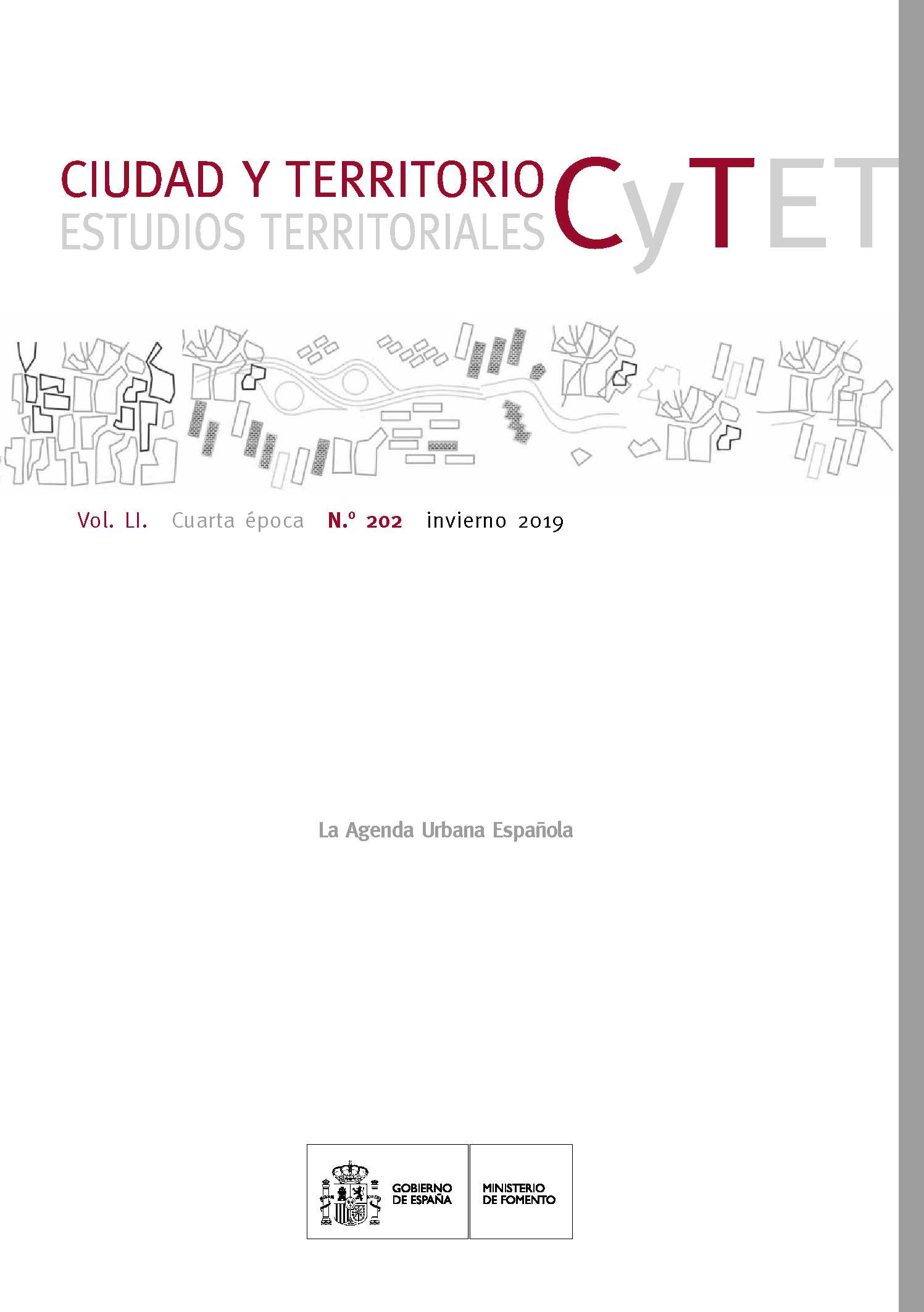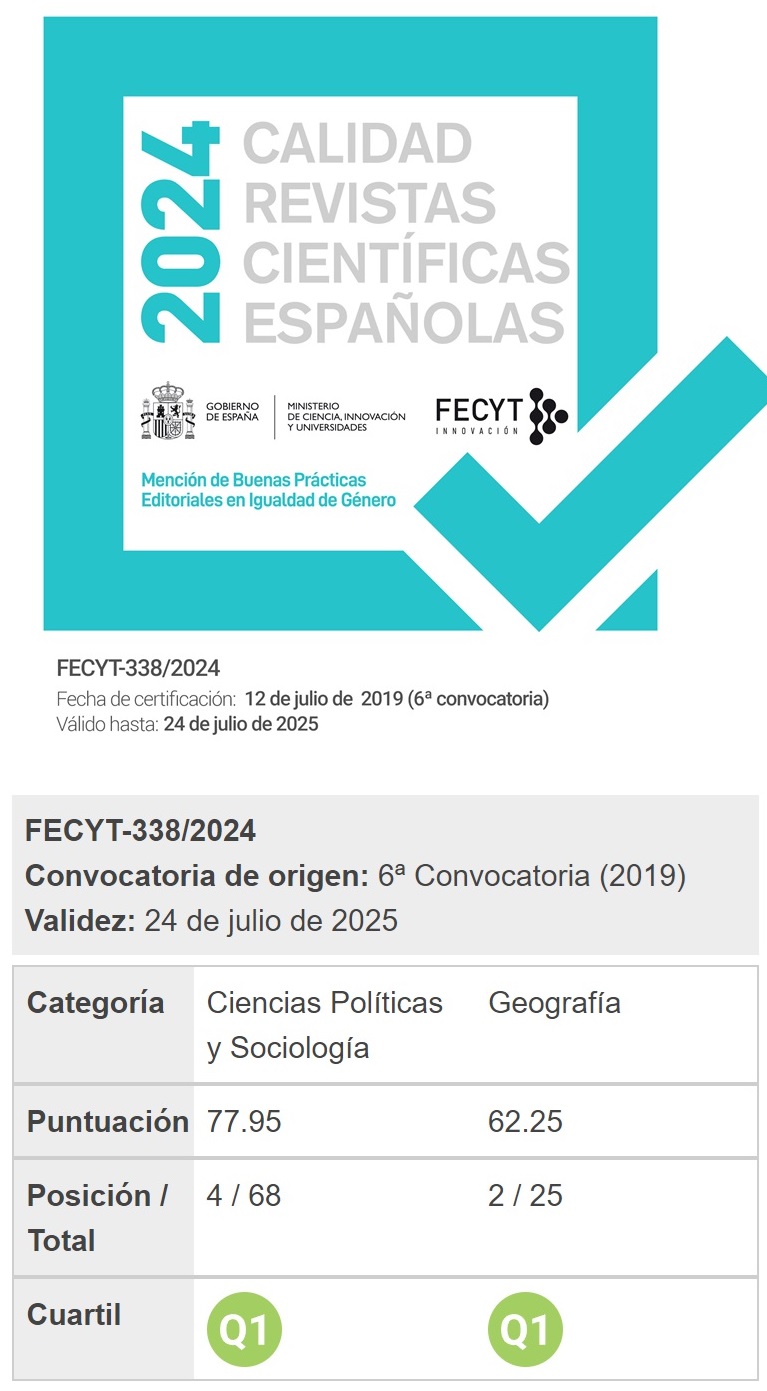La Agenda Urbana en el marco europeo. Experiencias internacionales de políticas urbanas
Palabras clave:
Agenda Urbana, Unión Europea, Partenariados, Políticas Urbanas, Gobernanza multinivelResumen
La implantación de la Agenda Urbana Española constituye tanto una oportunidad para desarrollar políticas urbanas de acuerdo con los parámetros del ODS 11 de la Agenda 2030, como un reto no exento de dificultades dado que incluye un variado elenco de materias, que afectan transversal y verticalmente a diversas Administraciones. Los desafíos de la ciudad del Siglo XXI tales como el cambio climático, la transición energética, la vivienda, la economía circular, las relaciones complementarias campo-ciudad o la dinamización del tejido urbano, exige un cambio de paradigma en la planificación y gestión como consecuencia de la transversalidad y complejidad de las materias. Dentro de este contexto tanto la Agenda Urbana europea como las Agendas Urbanas que han elaborado otros países constituyen referencias importantes por su innovadora metodología fundada en los principios de la gobernanza multinivel, así como por la concreción de sus acciones y su vinculación con los programas económicos que dota a estos documentos de un contenido y alcance práctico y eficaz. A su vez, una mirada comparada sobre ciudades que han llevado a cabo proyectos urbanos relacionados con el modelo de ocupación, vivienda y transición energética con éxito puede dar también algunas claves para garantizar la consecución de resultados concretos en las políticas urbanas. Como veremos en todos ellos concurren estrategias estables a largo plazo, planes con enfoques integrados y acciones concretas vinculadas a programas económicos que garantizan su implantación, así como una evaluación de resultados en el tiempo, una participación colaborativa de la sociedad civil y un liderazgo de la Administración que ejerce un rol activo en la coordinación y gestión de los proyectos vinculado una función de intermediación. En definitiva, unas claves conectadas con la gobernanza multinivel vertical y transversal que la Agenda Urbana Española podría constituir la oportunidad para introducirla en el contexto de su implantación.Descargas
Publicado
Cómo citar
Número
Sección
Licencia
Derechos de autor 2019 Ignacio Pemán-Gavín

Esta obra está bajo una licencia internacional Creative Commons Atribución-NoComercial-SinDerivadas 4.0.
Sin perjuicio de lo dispuesto en la legislación vigente sobre Propiedad Intelectual, y conforme a la misma, el/la los/las autor/a/es/as que publiquen en CyTET cede/n a título gratuito, de modo no exclusivo y sin límite temporal al Ministerio de Transportes, Movilidad y Agenda Urbana los derechos para difundir, reproducir, comunicar y distribuir en cualquier formato actual o futuro, en papel o electrónico, la versión original o derivada de su obra bajo licencia de Creative Commons Reconocimiento-NoComercial-SinObraDerivada 4.0 Internacional (CC BY-NC-ND 4.0), así como para incluir o ceder a terceros la inclusión de su contenido en índices, repositorios y bases de datos nacionales e internacionales, con referencia y reconocimiento en todo caso de la autoría del mismo.
Además, al realizar el envío, el/la los/las autor/a/es/as declara/n que se trata de un trabajo original en el que se reconocen las fuentes que han sido utilizadas en su estudio, comprometiéndose a respetar la evidencia científica y a no modificar los datos originales para verificar o refutar una hipótesis de partida; que el contenido esencial del mismo no ha sido publicado previamente ni se publicará en ninguna otra obra o revista mientras esté en proceso de evaluación en la revista CyTET; y que no se ha remitido simultáneamente a otra publicación.
Los autores deben firmar un Formulario de Cesión de Derechos, que les será enviado desde la Secretaría de CyTET una vez se acepte su artículo para ser publicado.
Con el objetivo de favorecer la difusión del conocimiento, CyTET se adhiere al movimiento de revistas de Open Access (OA) y entrega la totalidad de sus contenidos a diversos índices, repositorios y bases de datos nacionales e internacionales bajo este protocolo; por tanto, la remisión de un trabajo para ser publicado en la revista presupone la aceptación explícita por parte del autor/a de este método de distribución.
Se anima a las/os autoras/es a reproducir y alojar sus trabajos publicados en CyTET en repositorios institucionales, páginas web, etc. con la intención de contribuir a la mejora de la transferencia del conocimiento y de la citación de dichos trabajos.








 Enlace a CyTET en Linkedin
Enlace a CyTET en Linkedin